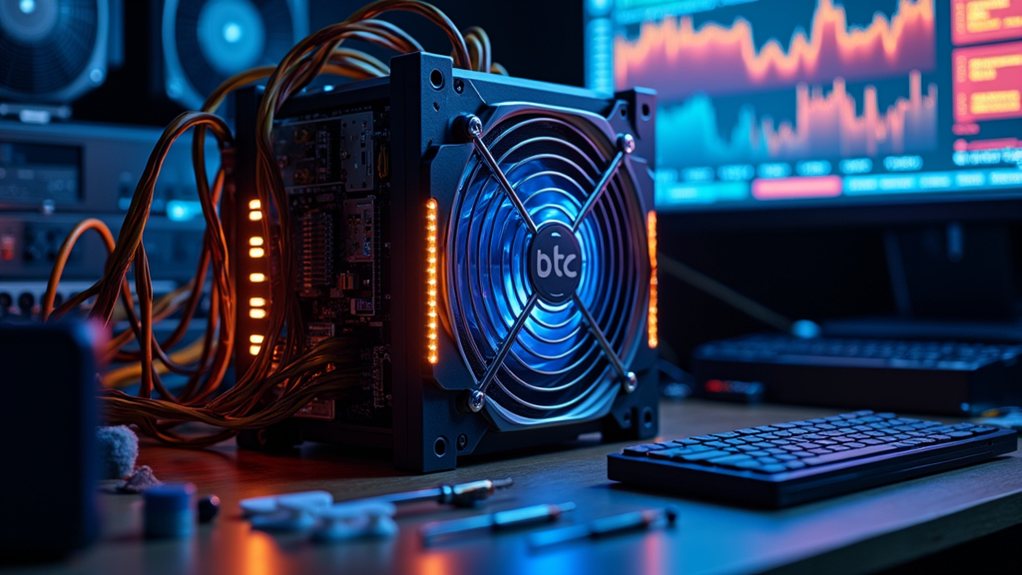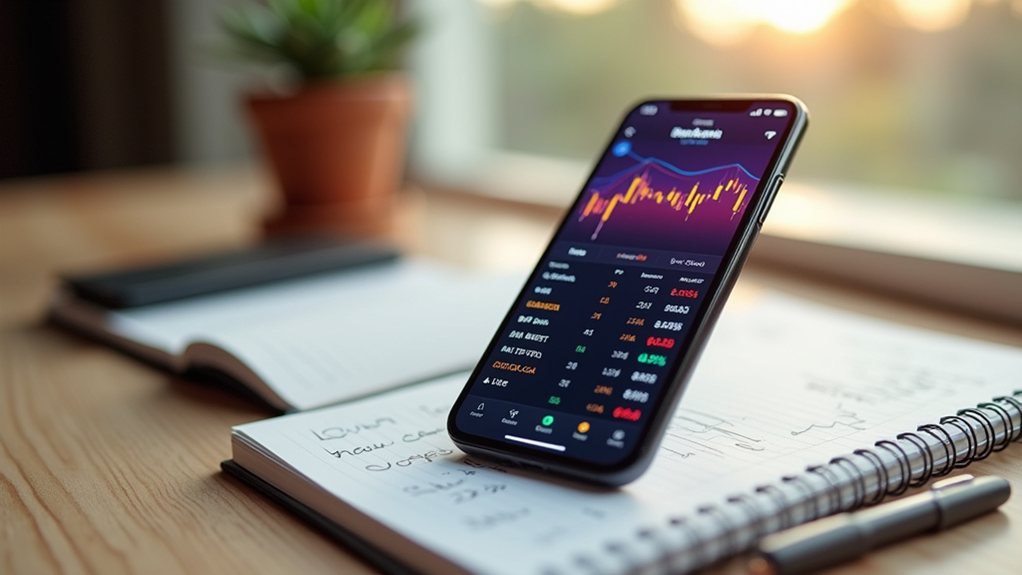Securing crypto investments isn't rocket science. Hardware wallets beat software options for keeping private keys safe. Never reuse passwords and enable two-factor authentication—not SMS-based (hello, SIM swapping). Store backups of keys and seed phrases in multiple secure locations; sharing them is asking for trouble. Keep devices updated and avoid sketchy public Wi-Fi. Diversification matters too—putting all eggs in one crypto basket is just gambling. The difference between keeping and losing your digital fortune lies in these details.

Maneuvering the crypto landscape can be treacherous for newcomers and veterans alike. The digital currency domain doesn't come with training wheels, and one wrong move could send your hard-earned assets into oblivion. Investors need multiple layers of protection. No excuses.
Hardware wallets stand as the gold standard for serious crypto holders. They keep private keys offline and away from hackers' greedy fingers. Software wallets offer decent security with better convenience, but they're not invincible. Some people still use paper wallets. Crazy, right? One coffee spill and your millions vanish. Mobile options exist for small amounts, but they're about as secure as a screen door on a submarine.
Your crypto wallet choice isn't just a preference—it's the fortress protecting your digital gold from the internet's endless siege.
Authentication matters. A lot. Using the same password everywhere? Might as well hand over your crypto directly to scammers. Two-factor authentication is non-negotiable, but SMS-based systems are increasingly vulnerable to SIM swapping. Authenticator apps or hardware keys provide substantially better protection. Biometrics add another solid layer when available.
Private keys and seed phrases deserve paranoid-level protection. Never, ever share them. Not with your spouse. Not with customer support. Not with that "helpful" person in your DMs. Store backups in multiple locations—preferably fireproof, waterproof, and thief-proof. Sound excessive? Tell that to people who've lost fortunes because their only key backup burned in a house fire.
Devices used for crypto activities need fortress-level security. Outdated software? Security nightmare. Public Wi-Fi without VPN? Amateur move. Those random browser extensions promising to "enhance" your crypto experience? Trojan horses in disguise. Keep systems clean, updated, and minimal.
The crypto sphere crawls with scammers. They're getting better at their game every day. Projects promising guaranteed returns are red flags waving frantically in your face. Impersonators lurk on every platform. Verify addresses multiple times before sending funds. Once that transaction confirms, there's no "undo" button.
Diversification isn't just financial wisdom—it's survival strategy. Putting everything in one cryptocurrency is like betting your life savings on a single number at roulette. Spread investments across established projects and promising newcomers. Rebalance periodically. Reviewing market conditions and trends regularly helps determine when to adjust your portfolio allocations for optimal risk management. Consider investing in different crypto sectors like DeFi or NFTs to further minimize risk exposure.
Staying informed requires diligence. Markets move at lightning speed. Regulations change. Security best practices evolve. Monitor accounts regularly for suspicious activity. Keep detailed transaction records—tax authorities worldwide are increasingly interested in crypto gains, and they're not known for their sense of humor when it comes to unreported income.
The crypto frontier remains largely untamed. Security isn't a one-time setup but a continuous process. The tools and techniques will change, but the fundamental principle remains: paranoia pays dividends in the cryptocurrency world. Non-custodial wallets provide complete control over your funds without relying on third parties to manage your private keys.
Frequently Asked Questions
How Can I Create a Strong Cryptocurrency Wallet Password?
Strong crypto wallet passwords require complexity. Period. Use a random password generator with a mix of characters—16-20 characters minimum.
Or try a passphrase: several unrelated words with numbers and symbols thrown in. Substitute characters (@for a).
Never use birthday dates or pet names. Smart investors use password managers to keep track of these monstrosities.
Obviously, don't write it on a sticky note. That's just asking for trouble.
What Are the Tax Implications of Crypto Trading Profits?
Crypto trading profits aren't tax-free. Not even close.
Every sale, swap, or purchase with crypto creates a taxable event. Short-term gains (under a year) get hit with ordinary income rates. Long-term? Lower rates of 0%, 15%, or 20%, depending on income.
High earners face an extra 3.8% Net Investment Income Tax too. Everything must be reported on Form 8949 and Schedule D.
The IRS watches. They always watch.
Can I Insure My Crypto Investments Against Theft or Loss?
Crypto insurance exists but it's limited. Options include specialized policies from insurtech startups and coverage through certain exchanges. These typically protect against theft, hacking, and private key loss—not user errors or market crashes.
Premium costs? Steep. Usually 1-5% of insured value annually, with high deductibles. Coverage caps hover around $5-10 million per policy.
Alternatives include decentralized insurance protocols and multi-signature wallets. Not perfect solutions, but something.
How Do I Identify Legitimate Cryptocurrency Projects From Scams?
Identifying legitimate crypto projects isn't rocket science.
Check the team's credentials—anonymous developers? Red flag.
Read the whitepaper critically; vague promises mean nothing.
Community matters too—real users versus paid shills.
Smart investors look for audited smart contracts and transparent tokenomics.
Established partnerships add credibility.
The crypto space is cluttered with garbage projects.
Due diligence separates the winners from the scams.
No shortcuts here.
What Is the Environmental Impact of Different Cryptocurrency Networks?
Cryptocurrency networks vary drastically in environmental impact.
Bitcoin's proof-of-work system devours electricity—173.42 TWh annually. Worse than Argentina. Seriously. It generates 85.89 MTCO2E yearly, with 62% coming from fossil fuels. Coal powers 45% of mining. Disgusting.
Ethereum slashed energy use by 99.9% after switching to proof-of-stake.
Hedera? Even greener at 0.02 Wh per transaction.
Meanwhile, Bitcoin miners create mountains of toxic e-waste—30.7 metric kilotons annually. Like the Netherlands' IT trash.







